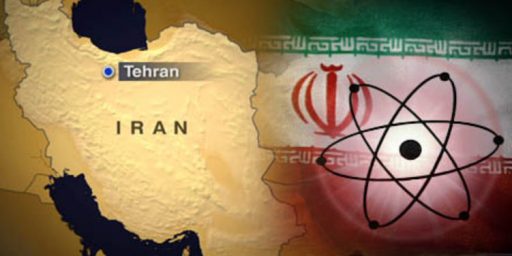What is an Expert?
Phillip Weiss offers a scathing attack of Persian Puzzle author Kenneth Pollack over at HuffPo.
[I] was shocked on flipping to page 429, the Author’s Note at the end of the book, to read that Pollack has never been to Iran and doesn’t speak Persian, has only dribs and drabs of Arabic.
[…]
This is one of the problems with our arrogant war policy. People who are experts on a place they’ve never been to. The intellectual equivalent of the smart bomb — you judge without ever having to hit the ground. Maybe we ought to do more to actually look around the countries we’re thinking of invading. Because, surprise, we might end up living there for a long time.
Tristero likens this to writing a book on brain surgery without having been to medical school or been in an operating room.
So, people who have never been to a place can not be experts? So, never having been to Ancient Egypt, all those historians and archeologists are frauds? Those astronomers studying Jupiter don’t know what they’re talking about?
Surely, people can gain expertise on a place without actually having been there. After all, few people who actually do live in a place lack expertise about it. Expertise is gained, generally, by intensive study rather than sheer osmosis.
Ron Beasley thinks Pollack is “bloviat[ing] on a subject about which [he] knows basically nothing” and is given “faux ‘mainstream’ credibility” because of his progressive credentials.
Here are Pollacks’ bona fides:
Education
Ph.D., Massachusetts Institute of Technology, 1996; B.A., Yale University, 1988Background
Previous Position(s): Director for National Security Studies, Council on Foreign Relations (2001-2002); Director for Persian Gulf Affairs, National Security Council (1999-2001); Director for Near East and South Asian Affairs, National Security Council (1995-1996); Senior Research Professor, National Defense University (1998-99, 2001); Iran-Iraq Military Analyst, Central Intelligence Agency (1988-1995)
One can take issue with Pollack’s analysis. But to argue that his geographic location disqualifies him from commenting is absurd.
Furthermore, the Persian Puzzle is not and does not purport to be about Iranian culture. Indeed, the book’s full title should have been a rather strong clue in that direction: The Persian Puzzle: The Conflict Between Iran and America . Here’s a brief precis:
[I]n The Persian Puzzle, published to coincide with the twenty-fifth anniversary of the Iran hostage crisis, he examines the behind-the scenes story of the tumultuous relationship between Iran and the United States, and weighs options for the future.
Here, Pollack, a former CIA analyst and National Security Council official, brings his keen analysis and insider perspective to the long and ongoing clash between the United States and Iran, beginning with the fall of the shah and the seizure of the American embassy in Tehran in 1979. Pollack examines all the major events in U.S.-Iran relations—including the hostage crisis, the U.S. tilt toward Iraq during the Iran-Iraq War, the Iran-contra scandal, American-Iranian military tensions in 1987 and 1988, the covert Iranian war against U.S. interests in the Persian Gulf that culminated in the 1996 Khobar Towers terrorist attack in Saudi Arabia, and recent U.S.-Iran skirmishes over Afghanistan and Iraq. He explains the strategies and motives from American and Iranian perspectives and tells how each crisis colored the thinking of both countries’ leadership as they shaped and reshaped their policies over time. Pollack also describes efforts by moderates of various stripes to try to find some way past animosities to create a new dynamic in Iran-U.S. relations, only to find that when one side was ready for such a step, the other side fell short.
With balanced tone and new insight, Pollack explains how the United States and Iran reached this impasse; why this relationship is critical to regional, global and U.S. interests; and what basic political choices are available as we deal with this important but deeply troubled country.
Why would one need to go to Iran to write that book?
The next thing you know, people will argue that those who have never been to war are unfit to write about it. . . .
Update: Jazz Shaw, not Beasley, wrote the post in question. I interpreted his opening line, “When I want to bloviate on a subject about which I know basically nothing, (and long time readers can probably confirm that’s a high percentage of my writing) I will generally at least make the effort to consult the work of somebody who is a subject matter expert in the field,” in the context of a discussion about Pollack’s credentials, as drawing a contrast. In the comments below, he explains that was not his intention.






A natural-enough extension of the credentialism that seems to be nearly everywhere these days. There’s a related phenomenon which I called “bootstrapping” and I think you’ve called “expertise creep”: when someone who’s a legitimate expert in one field implicitly claims expertise in a peripherally related (or unrelated) field.
Right now there’s kerfuffle going on in the blogosphere about one of the finest examples of such: Juan Cole. Dr. Cole is a real, honest-to-goodness expert in a rather narrow field of study primarily having to do with religious movements in the Middle East. I haven’t noticed any particular expertise on military history, military affairs, politics, or, for that matter, human nature.
Where to even begin, James? While I would enjoy debating you at any time and regularly follow your blog, you seem to have skimmed that post of mine you linked to a bit fast.
First, Ron Beasely didn’t write it. I did. It’s his blog, but I’m a guest poster there, so if you’re going to assign blame, lay it on me.
Next, the quote you referenced specfically talked about ME “bloviating” on things about which I basically know nothing (most things, of course) and the need to consult experts in that field. No reference was made to Pollack bloviating.
The “faux mainstream credibility” in that short excerpt was not assigned to Pollack, but to the neocons in general who were pushing for the war (Rumsfeld, Wolfowitz, et. al) by virtue of having a tradionally liberal or at least progressive authority agreeing with them on Iraq… not Iran. Iran wasn’t in the picture at that time aside from having been labeled as being part of the Axis of Evil.
On to the actual meat of the post, it’s my opinion, particularly in matters of international affairs, that there certainly is a difference in the quality or “level of expert opinion” if you will between somebody who has really experienced the native environment and somebody who had it phoned in to them and relies on others’ translations, interpretations, etc.
The book description which you quote makes it clear, as did the original article, that this book concerns primarily “tumultuous relationship between Iran and the United States” and the “major events in U.S.-Iran relations.” We’re talking about a difference in cultures here, and a vast one at that. As I pointed out in the original (sadly very short) post, you gain a certain level of credibility in terms of understanding that foreign culture when you’ve actually “soaked in it”, so to speak. Also, when interpreting the written language of important people from that culture, speaking that language can be vital, as translations have repeatedly been shown to be, at best, vague in some cases and completely wrong in others, particularly when you’re dealing with Farsi. That’s not to say that by studying the works of others you couldn’t gain a signifigant volume of knowledge on the subject, but if I want a real expert on the interaction between two distinctly different cultures, I’ll look up the person who has lived and breathed that culture and can really speak to it from first hand experience. In that area, I think we have far better experts than Pollack, and such distinctions seem more important as we look to be creeping closer and closer to a unilateral military strike against a very dangerous opponent.
Your comparison to astronomers is, as I see it, a straw man. There is no person who has lived on Jupiter or even visited it. The best we have are telescopes. We DO, on the other hand, have people who have lived in Iran, speak the language, read the source materials from their culture, and have dealt closely with them. Pollack is not one of them.
The military? Anyone is free to comment on the war or the military. This is America. But yes, I’ll give more credibility to opinions from those who served. Ron and I were both in back in the ‘Nam era, so it’s been a while, but I haven’t forgotten by a long shot.
Jazz: Apologies for the mischaracterization. I took you self-directed comments as intended as contrast with Pollack and thus an implied imputation.
I’m not sure how the Jupiter quip is a straw man, although it might be a false analogy. I merely use to to illustrate that one can have genuine expertise from afar.
I’m a veteran myself and don’t disagree that there’s value in the viewpoint of those who have been there, especially when discussing the ground’s eye view. Few privates, regardless of their battle scars, know much about strategy, though.
I don’t disagree that having a working knowledge of local languages is essential for certain fields of study. I own but haven’t yet read PERSIAN PUZZLE but gather that Pollack’s experiences and research are more than adequate to write about the policy-maker interactions between the governments.
If, on the other hand, he is doing content analysis of Iranian internal documents, I would agree that having to rely on a translator would be a handicap.
Thanks for the update, James, and no offense taken at all. It was a quickly dashed off post, and I certainly could have been more clear.
For the record, I will agree with you that it’s certainly possible to be a subject matter expert in some portions of a given area of study without first hand knowledge. Let’s wait and see how much actual source material and cultural material Pollack is digging into. As you say, the benefits can be enormous for the most absolutely qualified.
X= a mathematical term meaning “unknown”; spurt= a drip of water under pressure; therefore an expert is an unknown drip under pressure. that’s what my high school algebra teacher told me,really!